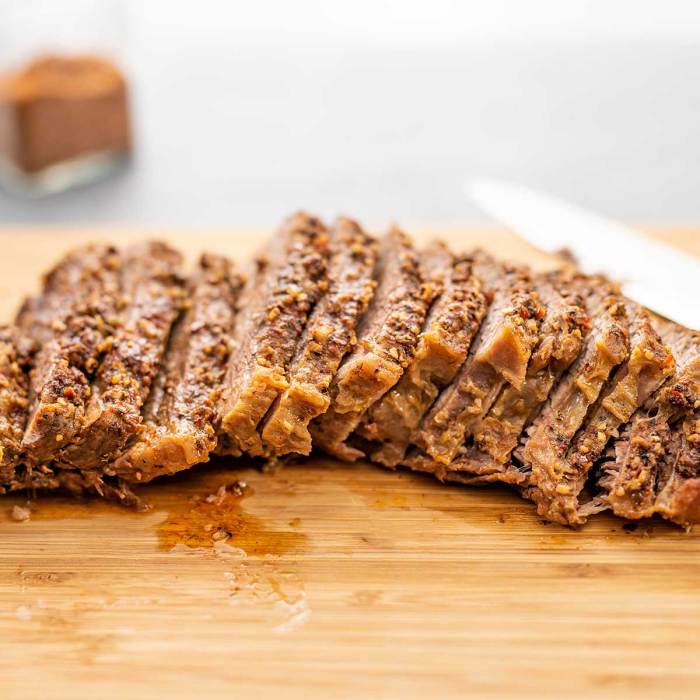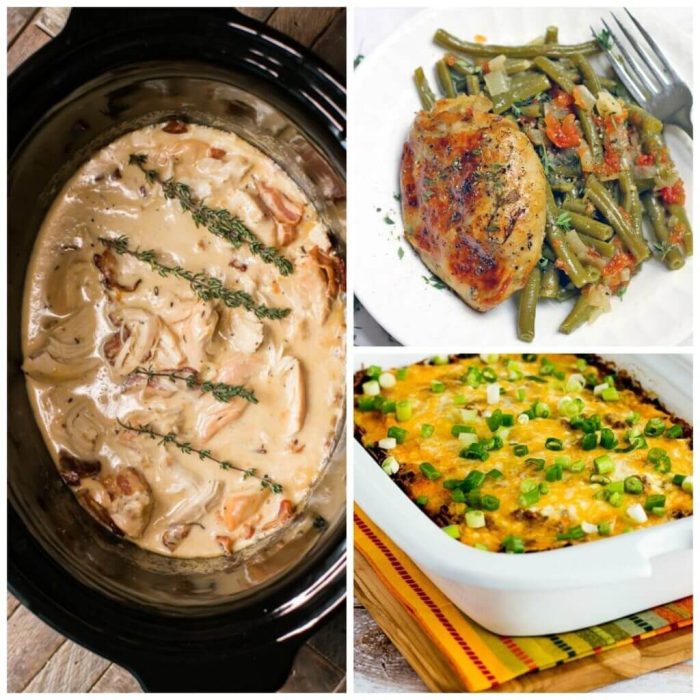Keto slow cooker recipes offer a delicious and convenient way to enjoy the benefits of the ketogenic diet. Combining the ease of slow cooking with the nutritional power of keto, these recipes are perfect for busy weeknights or weekend gatherings.
Imagine coming home to a comforting and flavorful meal that requires minimal effort on your part. That’s the magic of slow cooking, and with keto-friendly ingredients, you can enjoy healthy and satisfying dishes that align with your dietary goals.
Introduction to Keto Slow Cooker Recipes

The ketogenic diet, or keto diet, is a popular weight-loss strategy that involves drastically reducing carbohydrate intake and replacing it with fat. This forces the body to enter a metabolic state called ketosis, where it begins to burn fat for energy instead of carbohydrates.
Keto slow cooker recipes are a fantastic way to make delicious and healthy keto meals that are also convenient and easy to prepare.
Benefits of Ketogenic Cooking
Adopting a ketogenic lifestyle offers various health benefits, including:
- Weight loss: The keto diet is effective for weight loss as it promotes fat burning and reduces appetite.
- Improved blood sugar control: The low-carb nature of the keto diet can help regulate blood sugar levels, making it beneficial for individuals with type 2 diabetes.
- Reduced inflammation: Studies suggest that the keto diet may help reduce inflammation throughout the body, which can contribute to various health issues.
- Increased energy levels: Many people on the keto diet report experiencing increased energy and mental clarity.
Convenience of Slow Cooker Recipes
Slow cookers are a kitchen appliance that allows you to prepare meals with minimal effort.
- Time-saving: Slow cookers are ideal for busy individuals as they require minimal prep time and can cook meals while you’re away.
- Hands-off cooking: Once the ingredients are added to the slow cooker, you can set it and forget it, allowing you to focus on other tasks.
- Tender and flavorful results: Slow cookers break down tough cuts of meat, resulting in tender and flavorful meals.
Combining Keto and Slow Cooking
Combining the ketogenic diet with slow cooker recipes is a great choice for several reasons:
- Simplicity: Slow cookers are perfect for keto meals as they require minimal ingredients and often involve simple recipes.
- Flavorful and satisfying: Slow cooking allows flavors to meld and develop, resulting in delicious and satisfying keto meals.
- Nutrient-rich: Slow cooking preserves nutrients in food, ensuring you get the most out of your keto meals.
Essential Ingredients for Keto Slow Cooker Recipes
Slow cookers are a lifesaver for busy individuals, allowing you to prepare delicious meals with minimal effort. But what about those on a ketogenic diet? Fortunately, the slow cooker is an excellent tool for creating keto-friendly dishes, thanks to the abundance of keto-friendly ingredients that thrive in the slow-cooking process.
Let’s explore the essential ingredients for keto slow cooker recipes.
Protein Sources
Protein is a crucial component of a ketogenic diet, and slow cookers excel at tenderizing and flavoring various protein sources. Here are some excellent options:
| Category | Examples | Nutritional Benefits |
|---|---|---|
| Meat | Beef, pork, chicken, lamb, ground meat | High in protein, essential amino acids, iron, and B vitamins. |
| Seafood | Salmon, tuna, shrimp, cod | Rich in protein, omega-3 fatty acids, selenium, and vitamin D. |
| Poultry | Chicken, turkey | Lean protein, vitamin B6, niacin, and selenium. |
Vegetables
While the keto diet emphasizes low-carb vegetables, many are suitable for slow cooking and add valuable nutrients and flavor. Here’s a list of keto-friendly vegetables:
| Category | Examples | Nutritional Benefits |
|---|---|---|
| Leafy Greens | Spinach, kale, collard greens | Rich in vitamins A, C, K, and folate, as well as antioxidants. |
| Cruciferous Vegetables | Broccoli, cauliflower, Brussels sprouts | Excellent sources of vitamin C, fiber, and antioxidants. |
| Other Low-Carb Vegetables | Asparagus, mushrooms, zucchini, eggplant, bell peppers | Provide essential vitamins, minerals, and fiber. |
Healthy Fats
Healthy fats are a cornerstone of the keto diet, and slow cookers are perfect for incorporating them into your meals. Here are some options:
| Category | Examples | Nutritional Benefits |
|---|---|---|
| Oils | Olive oil, avocado oil, coconut oil | Provide healthy monounsaturated and saturated fats, along with antioxidants. |
| Nuts and Seeds | Almonds, walnuts, chia seeds, flax seeds | Rich in healthy fats, protein, fiber, and vitamins and minerals. |
| Avocados | Whole avocados | Excellent source of healthy fats, fiber, potassium, and vitamins C and K. |
Keto Slow Cooker Recipe Ideas: Keto Slow Cooker Recipes
The slow cooker is a kitchen essential for busy individuals looking to prepare healthy and delicious meals without spending hours in the kitchen. This versatile appliance allows you to create a variety of keto-friendly recipes with minimal effort.
Keto Slow Cooker Recipe Ideas
Here are a few keto slow cooker recipe ideas to inspire your culinary creativity:
| Recipe Name | Description | Ingredients | Serving |
|---|---|---|---|
| Keto Beef Stew | A hearty and flavorful stew packed with protein and vegetables. | Beef chuck roast, onions, celery, carrots, garlic, beef broth, tomato paste, Worcestershire sauce, salt, pepper, and optional seasonings like thyme and rosemary. | 6-8 servings |
| Keto Chicken Enchilada Soup | A creamy and comforting soup with a Mexican twist. | Chicken breasts, onions, bell peppers, garlic, chicken broth, tomato paste, enchilada sauce, heavy cream, shredded cheese, and optional toppings like avocado and cilantro. | 6-8 servings |
| Keto Pulled Pork | Tender and flavorful pulled pork perfect for sandwiches, salads, or wraps. | Pork shoulder, onion, garlic, apple cider vinegar, Worcestershire sauce, salt, pepper, and optional seasonings like smoked paprika and chili powder. | 6-8 servings |
| Keto Chili | A spicy and satisfying chili packed with protein and vegetables. | Ground beef, onions, bell peppers, garlic, kidney beans, tomato paste, tomato sauce, chili powder, cumin, paprika, and optional toppings like sour cream, avocado, and cheese. | 6-8 servings |
| Keto Chicken and Broccoli Stir-Fry | A quick and easy stir-fry with a flavorful sauce. | Chicken breasts, broccoli florets, soy sauce, ginger, garlic, sesame oil, and optional seasonings like red pepper flakes. | 4-6 servings |
Tips for Successful Keto Slow Cooker Recipes
The slow cooker is a fantastic tool for keto cooking, offering hands-off convenience and flavorful results. Here are some tips to ensure your keto slow cooker recipes are a success:
Adjusting Cooking Times for Different Cuts of Meat
The cooking time for meat in a slow cooker varies depending on the cut. Leaner cuts of meat, such as chicken breasts or pork tenderloin, cook faster than tougher cuts like chuck roast or beef short ribs. Here’s a general guide for adjusting cooking times:
- Leaner Cuts:Cook for 4-6 hours on low or 2-3 hours on high.
- Tougher Cuts:Cook for 6-8 hours on low or 4-6 hours on high.
It’s always a good idea to check the internal temperature of the meat to ensure it’s cooked through. A meat thermometer inserted into the thickest part of the meat should read 165°F (74°C) for poultry and 145°F (63°C) for beef, pork, and lamb.
Preventing Dry Meat in the Slow Cooker
Dry meat is a common problem in slow cooker recipes. Here are some strategies to prevent this:
- Use a Moisture-Rich Base:Start with a flavorful broth or sauce instead of just water. This adds moisture and flavor to the meat.
- Add Fat:Fat helps keep meat moist. Consider adding a tablespoon or two of olive oil or butter to the slow cooker.
- Don’t Overcook:Overcooking meat can make it dry. Check the internal temperature of the meat regularly to ensure it’s cooked through but not overcooked.
- Use a Liquid-to-Meat Ratio:A general rule of thumb is to use about 1 cup of liquid for every 1 pound of meat. This helps ensure the meat is submerged in liquid and doesn’t dry out.
Using Broth Instead of Water
Using broth instead of water in your slow cooker recipes adds depth of flavor and moisture to your dish. Choose a broth that complements the flavors of your recipe. For example, beef broth is ideal for beef stew, chicken broth works well for chicken recipes, and vegetable broth can be used for vegetarian dishes.
Thickening Sauces for a More Satisfying Texture
While slow cooker recipes often result in a flavorful sauce, it can sometimes be too thin. Here are some tips for thickening sauces:
- Use a Thickening Agent:Popular keto-friendly thickening agents include xanthan gum, arrowroot powder, and cornstarch. Simply whisk a small amount into a little cold broth and stir into the sauce in the last 30 minutes of cooking.
- Reduce the Sauce:If you don’t have a thickening agent on hand, you can reduce the sauce by simmering it on the stovetop for a few minutes. This will evaporate some of the liquid, making the sauce thicker.
Variations and Adaptations
Keto slow cooker recipes offer a fantastic foundation for delicious and healthy meals. However, you can easily customize them to suit your specific needs and preferences. This section explores common variations and adaptations to enhance your keto cooking experience.
Keto-Friendly Substitutions
You can easily swap out ingredients in keto slow cooker recipes to suit your dietary needs and preferences.
- For dairy-free options:Replace heavy cream with unsweetened coconut milk or almond milk.
- For nut-free options:Substitute almond flour with coconut flour, sunflower seed flour, or a combination of both.
- For a lower-carb option:Swap out regular tomatoes for diced tomatoes with no added sugar.
- For a richer flavor:Add a tablespoon of butter or ghee for a richer, creamier texture.
- For a spicier kick:Incorporate chili powder, cayenne pepper, or other spices to elevate the flavor profile.
Adapting Recipes for Dietary Restrictions
Keto slow cooker recipes can be easily modified to accommodate various dietary restrictions.
- Dairy-Free:Substitute dairy ingredients like cream or cheese with plant-based alternatives like unsweetened coconut milk, almond milk, or dairy-free cheese.
- Nut-Free:Replace almond flour with coconut flour, sunflower seed flour, or a combination of both. Ensure that all other ingredients are nut-free.
- Gluten-Free:Most keto slow cooker recipes are naturally gluten-free, but double-check the ingredients list for any potential cross-contamination.
- Egg-Free:While eggs are often used in keto recipes, you can substitute them with flaxseed meal or chia seeds mixed with water.
Adjusting Recipes for Spice Levels and Preferences, Keto slow cooker recipes
You can easily tailor keto slow cooker recipes to your desired spice level and personal preferences.
- For a milder flavor:Reduce the amount of spices used in the recipe, or omit them altogether.
- For a spicier kick:Increase the amount of spices, or add additional chili powder, cayenne pepper, or other hot peppers.
- For a sweeter taste:Incorporate a small amount of stevia or erythritol, natural sugar substitutes that are keto-friendly.
- For a savory flavor:Add additional savory ingredients like bouillon, herbs, or spices.
Meal Planning and Storage

Planning keto meals using slow cooker recipes can be a great way to save time and effort during the week. By preparing a few slow cooker meals in advance, you can have healthy and delicious keto options ready to go whenever you need them.
When investigating detailed guidance, check out can i use gasoline in recipe now.
Planning Keto Meals
When planning your keto meals using slow cooker recipes, it’s important to consider your schedule and preferences. Here are some tips for effective meal planning:
- Choose recipes that fit your lifestyle.If you’re busy during the week, choose recipes that can be prepared ahead of time and reheated. If you have more time, you can choose recipes that require more hands-on preparation.
- Consider your favorite flavors and ingredients.There are endless possibilities when it comes to keto slow cooker recipes. Experiment with different flavors and ingredients to find what you enjoy most.
- Plan for leftovers.Slow cooker recipes often yield large portions, which is perfect for meal prepping. Plan to use leftovers for lunch or dinner the next day.
- Batch cook.If you have the time, consider batch cooking multiple slow cooker meals at once. This can save you even more time and effort in the long run.
Storing Leftovers
Proper storage is essential for keeping your keto slow cooker leftovers safe and delicious. Here’s how to store leftovers effectively:
- Allow leftovers to cool completely before storing.This helps prevent bacterial growth.
- Store leftovers in airtight containers.This will help to prevent freezer burn and keep the food fresh.
- Label and date your containers.This will help you keep track of what’s in your fridge and ensure that you’re using leftovers within a reasonable timeframe.
- Refrigerate leftovers within two hours of cooking.This is especially important during the summer months when temperatures are higher.
- Freeze leftovers for longer storage.Most slow cooker recipes can be frozen for up to 3 months. Thaw leftovers in the refrigerator overnight before reheating.
Repurposing Leftovers
Don’t let leftover keto slow cooker meals go to waste! There are many creative ways to repurpose leftovers into new dishes. Here are a few ideas:
- Turn leftovers into a salad topping.Shredded chicken, beef, or pork can be added to salads for a boost of protein and flavor.
- Use leftovers in a stir-fry.Add leftover chicken, beef, or pork to a stir-fry with your favorite vegetables and sauce.
- Make a soup or stew.Leftover chicken, beef, or pork can be used to make a hearty soup or stew.
- Create a casserole.Leftover chicken, beef, or pork can be used to create a delicious casserole with cheese, vegetables, and other toppings.
- Make a breakfast burrito.Leftover chicken, beef, or pork can be used to make a breakfast burrito with eggs, cheese, and other fillings.
The Importance of Nutritional Considerations

While the ketogenic diet is effective for weight loss and other health benefits, it’s crucial to understand its nutritional implications and ensure you’re getting the nutrients your body needs.
Maintaining Electrolyte Balance
Electrolyte balance is vital on the keto diet. When you drastically reduce carbohydrates, your body enters ketosis, and your kidneys excrete more sodium, potassium, and magnesium. This can lead to symptoms like fatigue, muscle cramps, headaches, and dizziness.Here’s how to maintain proper electrolyte balance:* Drink plenty of water:Aim for at least 8 glasses of water daily.
Consume electrolyte-rich foods
Include foods like leafy greens, avocado, bone broth, and unsweetened coconut water in your diet.
Consider electrolyte supplements
If you’re experiencing significant electrolyte imbalance, talk to your doctor about taking supplements.
The Role of Healthy Fats
Healthy fats are an essential part of a ketogenic diet. They provide energy, support hormone production, and promote satiety.Here are some healthy fats to incorporate into your keto slow cooker recipes:* Avocado oil:Rich in monounsaturated fats and antioxidants.
Olive oil
A staple in Mediterranean cuisine, known for its heart-healthy benefits.
Coconut oil
A good source of medium-chain triglycerides (MCTs), which are quickly converted to energy.
Butter
Choose grass-fed butter for optimal nutrient content.
Nuts and seeds
Almonds, walnuts, chia seeds, and flaxseeds are excellent sources of healthy fats and other nutrients.
Incorporating a Variety of Vegetables
While ketogenic diets emphasize low-carb vegetables, it’s important to include a variety of vegetables for optimal nutrition.Here are some tips for incorporating vegetables into keto slow cooker recipes:* Choose low-carb vegetables:Broccoli, cauliflower, spinach, kale, Brussels sprouts, asparagus, and zucchini are all keto-friendly options.
Add vegetables to stews and soups
Vegetables like bell peppers, onions, and mushrooms can add flavor and texture to your keto slow cooker meals.
Roast vegetables
Roasting vegetables in the oven before adding them to your slow cooker can enhance their flavor and texture.
Use vegetable broth
Instead of water, use vegetable broth to add extra flavor and nutrients to your slow cooker dishes.
Epilogue
With keto slow cooker recipes, you can embrace a lifestyle that is both delicious and healthy. From hearty stews to savory soups, the possibilities are endless. So, fire up your slow cooker and get ready to embark on a culinary adventure that will leave you feeling satisfied and energized.
